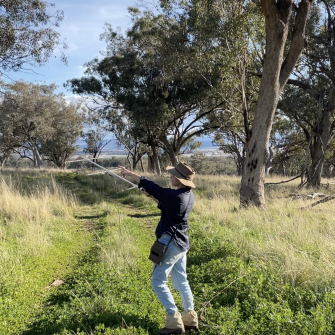Master of Statistics
- Commencing Terms
- Term 1, 2 & 3
- Duration
- 1.7 Year(s)
- Delivery Mode
- Face-to-face (includes blended)
- Campus
-
Kensington
- Codes
- Program code 8750
- CRICOS code 001008F
-
Commonwealth Supported Places are available for this program2026 Indicative first year full fee
- $6,000*
-
2026 Indicative full fee to complete degree
- $9,000*
-
2026 Indicative first year full fee
- $60,500*
-
2026 Indicative full fee to complete degree
- $94,000*

Application closures for 2026
Undergraduate programs for 2026 intakes are closed for New Overseas Student Commencement (NOSC) applications. Applications for postgraduate programs remain open. Find out if this closure applies to you.
- Overview
- Entry requirements
- What will I study?
- Future careers
- How to apply
- Fees & Scholarships
Overview
Do you enjoy working with numbers and approaching problems in analytical ways? Are you interested in applying data-driven, evidence-based solutions to real-world challenges? The Master of Statistics at UNSW is for practising or aspiring statisticians seeking advanced training in mathematics and statistical analysis. The longest-running program of its kind in Australia, this highly regarded master’s degree can open up a range of career opportunities or prepare you for further statistical research.
Throughout the Master of Statistics, you’ll deepen your understanding of statistical science while building strong consulting and project writing skills. You’ll also apply your learning to real-world contexts such as finance, engineering and medical or biological science. Whether you pursue a career as a practising statistician, undertake your own research project, or explore the many other pathways this degree opens up, the Master of Statistics will equip you for long-term success.
Key features
Gain transferable skills for future roles
Studying statistics improves your logical thinking, problem solving, analytical skills, creativity and adaptability. Graduate with transferable skills that are highly valued by employers across diverse sectors.
Graduate ready for a range of careers
The Master of Statistics can open up a range of career opportunities in areas such as banking, insurance and investment, environmental modelling, oceanography, meteorology, computing and IT. It can also lead to roles within government or education, or prepare you to undertake research at a PhD level.
Lead an in-depth research project
Put your knowledge into practice through a supervised research project. This research project is compulsory for all Master of Statistics students. It will prepare you for the problem-solving and report-writing aspects of future employment, or for progression into a research degree.
Why study at UNSW?
Learn with the best
UNSW's School of Mathematics and Science is ranked #2 in Australia and in the global top 50 for mathematics (QS World University Rankings by Subject, 2025). Learn from leading academics at the forefront of research.
Leverage our industry connections
Tap into our network of industry and research partners to start building your own professional connections. As a global top 20 university (QS World University Rankings, 2024–2026), the School of Mathematics and Statistics maintains and attracts strong links with industry. Several members of staff hold Australian Research Council (ARC) Linkage Grants and industry partners sponsor some of our courses and degrees. Other links with industry are maintained through visiting appointments, consulting services offered by our staff and ongoing connections with our alumni.
Learn in state-of-the-art facilities
UNSW Science is home to 20+ research centres as well as dozens of state-of-the-art laboratories, clinics, simulators – fully equipped with innovative tech that’s shaping the future of science.
Want to see more from UNSW Science?
Entry requirements
For entry into this degree, students must have:
- A recognised bachelor degree (or equivalent qualification): With a major in a cognate discipline; and
- An overall average of 65 or higher: As determined by the UNSW Postgraduate Coursework Entry Calculator; or
- An average of 65 or higher in at least 4 courses: In mathematics or statistics at the second-year undergraduate level or above, as determined by the UNSW Postgraduate Coursework Entry Calculator
- Assumed knowledge: A mathematical background in a minimum of course in several variable calculus, one course in linear algebra, one course in probability, and one course in theory at the university undergraduate level
Cognate disciplines |
|
English language requirements
You may be asked to provide evidence of your English proficiency to study at UNSW depending on your educational background and citizenship. English language skills are vitally important for coping with lectures, tutorials, assignments and examinations - this is why UNSW requires a minimum English language competency for enrolment.
If you’re completing an Australian Year 12 qualification (e.g. NSW HSC or equivalent), you do not need to provide anything extra to prove your proficiency. Your qualification will be used as evidence of your English proficiency.
If you do need to provide evidence of your English proficiency, this will be indicated in your application. You can prove this by providing evidence that you meet one or more of the following criteria:
- English language tests and university English courses
- Prior study in the medium of English
- Other qualifications
If you need to improve your English skills before you start your degree, UNSW College’s Academic English Programs are for you. The programs are suitable for various English levels and help you prepare for university studies and life in Australia.
For more details, visit the English Language Requirements page.
For entry into this degree, students must have:
- A recognised bachelor degree (or equivalent qualification): With a major in a cognate discipline; and
- An overall average of 65 or higher: As determined by the UNSW Postgraduate Coursework Entry Calculator; or
- An average of 65 or higher in at least 4 courses: In mathematics or statistics at the second-year undergraduate level or above, as determined by the UNSW Postgraduate Coursework Entry Calculator
- Assumed knowledge: A mathematical background in a minimum of course in several variable calculus, one course in linear algebra, one course in probability, and one course in theory at the university undergraduate level
Cognate disciplines |
|
English language requirements
You may be asked to provide evidence of your English proficiency to study at UNSW depending on whether you are from an English-speaking background or non-English speaking background. English language skills are vitally important for coping with lectures, tutorials, assignments and examinations - this is why UNSW requires a minimum English language competency for enrolment.
If English is not your first language, you’ll need to provide proof of your English proficiency before you can be given an offer to study at UNSW. You can do this by providing evidence that you meet one or more of the following criteria:
- English language tests and university English courses
- Prior study in the medium of English
- Other qualifications
If you need to improve your English skills before you start your degree, UNSW College’s Academic English Programs are for you. The programs are suitable for various English levels and help you prepare for university studies and life in Australia.
For more details, visit the English Language Requirements page.
Check the specific English language requirements for this program
What will I study?
UNSW is introducing a new academic calendar from 2028.
We are moving to a new flex-semester calendar. What does this mean for your studies?
Program structure
The Master of Statistics provides advanced training in the principles of mathematics and statistical analysis. You’ll learn statistical theory and how to put it into practice, including core courses in Advanced Stochastic Processes and Statistical Interference.
Full program structure
The Master of Statistics can be completed in 1.7 years of full-time study. Students must complete 72 units of credit (UOC) total, comprising the following course components.
-
Students must complete the following two core courses (12 UOC):
- Advanced Stochastic Processes (6 UOC)
- Statistical Inference (6 UOC)
-
Students must take 8 elective courses from those listed in the Handbook. Of these electives, students are allowed to take up to 3 courses (18 UOC) external to the School of Mathematics and Statistics (that is, courses that do not have a MATH or DATA prefix).
-
Students must take either MATH5925 Project (12 UOC) in one term or MATH5005 Project (6 UOC) and MATH5006 Project (6 UOC) over two consecutive terms (with approval of supervisor).
Please note, a WAM greater than 65 is recommended for MATH5925 and greater than 85 for MATH5005/5006. Students seeking to enrol into a MATH5005/5006 are required to have the approval of the Director of Postgraduate Studies.
-
The graduate certificate and graduate diploma provide an articulation pathway into the Master of Statistics.
Students who have completed the Graduate Certificate (7659) and have a WAM of 65 may apply to transfer into this Masters program and will receive up to 24 UOC of Advanced Standing.
Students who have completed the full 48 UOC of the Graduate Diploma (5659), and have a WAM of 65, may apply to transfer into this Masters program and will receive up to 48 UOC of Advanced Standing.
Students who have completed 24 UOC of the Graduate Diploma (5659), and have a WAM of 65, may apply to transfer into this Masters program and will receive up to 24 UOC of Advanced Standing.
Future careers
Statisticians have highly transferable skills and work in a wide variety of sectors and industries. Graduates from UNSW’s Master of Statistics have excellent problem-solving, computing and communication skills, as well as the ability to think both logically and creatively to tackle real-world problems.
Master of Statistics graduates go on to work in areas such as:
|
|
Academic and research positions within universities, the CSIRO and the Defence Science and Technology Organisation are also available for those ready to discover new knowledge in mathematics and statistics.
Demand for statisticians in Australia is strong, with job growth projected to increase by 11.0% over the next five years (Seek, 2025). Statisticians also enjoy strong earning potential, with an average salary of $115,000 per year in Australia. (Seek, 2025).
Potential careers for Master of Statistics graduates (by industry)
| Core statistics and quantitative roles | Statistician, mathematical statistician, applied statistician, statistical analyst, quantitative analyst, quantitative researcher, statistical consultant, statistical modeller, biostatistician, epidemiological statistician |
| Data, analytics & business intelligence | Data analyst, senior data analyst, analytics consultant, business analyst (data/analytics focus), business intelligence (BI) analyst, insights analyst, customer insights analyst, commercial analyst, reporting analyst, decision science analyst |
| Data science & machine learning | Data scientist, junior data scientist, applied data scientist, machine learning analyst, predictive analytics specialist, statistical machine learning engineer, AI analyst (analytics/modelling focus) |
| Finance, risk & actuarial-adjacent roles | Quantitative analyst (finance), risk analyst, credit risk analyst, market risk analyst, financial modelling analyst, pricing analyst, forecasting analyst |
| Government, policy & public sector | Statistician (state government), statistical officer, data analyst (policy), policy analyst (quantitative), evaluation analyst, program evaluation analyst, social research analyst, population analyst |
| Health, medical & life sciences | Biostatistician, clinical data analyst, health data analyst, epidemiology analyst, medical statistician, research statistician (health), public health analyst |
| Industry, engineering & technical fields | Operations research analyst, quality analyst, reliability engineer (statistics-based), process improvement analyst, experimental design analyst, industrial statistician |
| Research, academia & higher education | Research assistant (statistics), research officer (quantitative), research fellow (post-PhD), statistical research associate, quantitative research assistant, academic tutor/teaching associate (statistics) |
| Specialist & emerging titles | Decision scientist, analytics translator, causal inference analyst, experimentation analyst (A/B testing), measurement scientist, modelling & simulation analyst |
How to apply
Applications must be submitted through our Apply Online portal. We encourage you to submit your completed application as early as possible to ensure it will be processed in time for your preferred term. Some high-demand programs and Faculties with limited places may have an earlier application deadline or commencement date. Find out more.
Ready to start your application?
For most international students, applications are submitted via our Apply Online service. We encourage you to submit your completed application as early as possible to ensure it will be processed in time for your preferred term.
Some high-demand programs with limited places, may have an earlier application deadline or may have an earlier commencement date. For details, visit the international admissions information page.
Ready to start your application?
Fees & Scholarships
There are a limited number of Commonwealth Supported Places (CSP) available for this degree/program. Your eligibility to receive a CSP will be automatically assessed when you apply. Please note that eligibility for Commonwealth Supported Places (CSPs) is competitive, with places awarded based on academic merit. Start your postgraduate application today with our guide on how to apply.
Commonwealth Study Assistance such as Austudy, and Youth Allowance is available for some master’s degrees. For the most up-to-date information and list of degrees visit UNSW Current Student Financial Support.
There are a limited number of Commonwealth Supported Places (CSP) available for this degree/program. Your eligibility to receive a CSP will be automatically assessed when you apply. To find out more about Commonwealth Supported Places visit Postgraduate Commonwealth Support.
*Fees are subject to annual review (or when required) by the University and may vary accordingly.
Indicative fees are a guide only and have been calculated based on the typical enrolment patterns of students undertaking the degree/program. The indicative fees listed here is an estimate for tuition only and excludes non-tuition fees and charges. The amount you pay will vary depending on the calendar year of enrolment, the courses you select and whether your study load is more or less than 1 Equivalent Full Time Student Load (48 units of credit (UOC) per year)
You should not rely on indicative fees as fee increases are assessed when required and may exceed the indicative figures listed here. Actual fees are calculated on enrolment. More information on fees can be found at the UNSW fees website.
*Fees are subject to annual review by the University and may increase annually, with the new fees effective from the start of each calendar year. The indicative fees listed here are based on an estimated average and are for tuition only, other fees and charges are not included. The amount you pay will vary depending on the calendar year to enrol, the courses you select and whether your study load is more or less than 1 Equivalent Full Time Student Load (8 courses per year).
Indicative fees are a guide for comparison only based on current conditions and available data. You should not rely on indicative fees. More information on fees can be found at the UNSW fees website.
Indicative fees to complete the program have been calculated based on a percentage increase for every year of the program. Fee increases are assessed annually and may exceed the indicative figures listed here.
Indicative fees to complete the program include tuition plus an estimate of study-related costs of approximately $1,000 per year. To find out more about other costs, visit UNSW International.
Scholarships
At UNSW, we award over $83 million in scholarships each year. We pride ourselves on rewarding excellence and making university accessible to students from all walks of life. Whether you’re a domestic or international student, our range of scholarships, prizes and awards can support your journey.
Progress starts here – at a world-leading university

Top 20 Worldwide
Ranked in the global top 20 for three consecutive years
QS World University Rankings, 2024–2026

Winner of the AFR Most Employable University Award six years in a row
AFR Top100 Future Leaders Awards, 2020–2025

Australia's #1 for Innovation
Highest number of startups and spinouts from university-developed tech
SCOPR report, 2024






